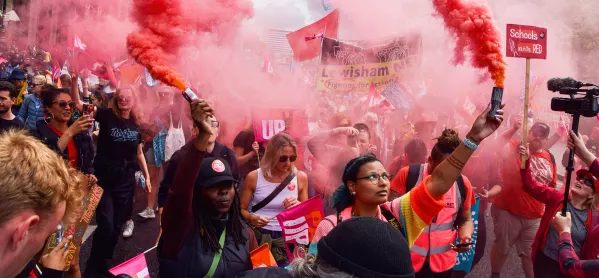Strikes: ‘Funded 6.5% pay rise would stop walkouts’

A teaching union leader has said the government could bring an end to the ongoing teacher strikes if it met and funded a 6.5 per cent pay rise for teachers, which an independent pay body is understood to have recommended.
Dr Mary Bousted, joint general secretary of the NEU teaching union, said the matter was in the government’s hands as its members took part in a second day of strike action this week.
Teachers are walking out on the seventh and last day of national strike action this academic year in a long-running dispute over pay, having rejected the government’s offer of a £1,000 one-off payment for the current school year (2022-23) and an average 4.5 per cent rise for staff next year.
The NEU is the only union with a mandate to strike at present but the Department for Education is in dispute with all four of the main education unions (the NEU, the NASUWT teaching union, the Association of School and College Leaders and the NAHT school leaders’ union), which are all balloting for strike action next year - that could be coordinated.
- Conference: NEU votes for more summer strikes
- Unions: Heads and teachers planned linked strikes
- Teacher strikes: Unions urge new pay talks after 6.5% leak
The unions have also repeatedly called upon the DfE to publish the recommendations of the Schools Teachers’ Review Body, which is said to have recommended a 6.5 per cent pay rise for teachers next year.
Speaking on BBC Radio 4’s Today programme, Dr Bousted said: “This could stop. What the government must do is publish the individual pay review body recommendations.
“If it is 6.5 per cent, they must fund schools in order to be able to pay that. And if that were the case, I believe that this would stop, so it is in the government’s hands.”
However, education minister Robert Halfon said it was “impossible to say” what decision would be taken as he was pressed for a response to industrial action posing disruption to schools again today.
Appearing on Sky News, Mr Halfon said: “The message from the government is that we have to be as fair as possible, given the very difficult economic circumstances…We have to be as fair as possible to teachers and support staff, I completely get that.
“But we have to be fair to the taxpayer and make sure we bear down on inflation as well, as that is the biggest tax on the cost of living - that would affect everyone, teachers and support staff included.”
NEU joint general secretary Kevin Courtney said: “No teacher wants to be taking strike action and this week’s strike action should not have been necessary.
“The responsibility for it lies at the door of the prime minister and the education secretary who continue to refuse to re-enter negotiations with education unions to reach a settlement on a fully-funded pay increase for teachers.”
The NEU has held seven national strike days and three regional strike days since getting a mandate to strike this year.
The DfE said the action would cause disruption to pupils and parents and result in the cancellation of end-of-term events for pupils.
It is the second day of action this week, following Wednesday’s strike, which resulted in many schools being either fully closed or restricted access to certain groups of pupils.
The government is following a policy of public pay restraint as part of a strategy to curb inflation, which has led to a series of disputes with workers.
The DfE insisted a “fair and reasonable” pay offer had been made to the unions.
A department spokesperson said: “This strike action will see the cancellation of end-of-term events and important transition days to secondary schools, impacting children and causing more disruption for parents.”
On pay, the spokesperson said: “As part of the normal process, the independent School Teachers’ Review Body has submitted its recommendations to the government on teacher pay for 2023-24.
“We will be considering the recommendations and will publish our response in the usual way.”
You need a Tes subscription to read this article
Subscribe now to read this article and get other subscriber-only content:
- Unlimited access to all Tes magazine content
- Exclusive subscriber-only stories
- Award-winning email newsletters
Already a subscriber? Log in
You need a subscription to read this article
Subscribe now to read this article and get other subscriber-only content, including:
- Unlimited access to all Tes magazine content
- Exclusive subscriber-only stories
- Award-winning email newsletters
topics in this article



